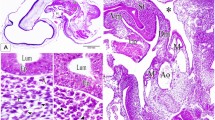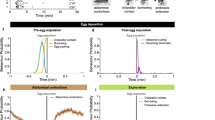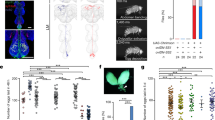Abstract
MATURE adult female Schistocerca gregaria contain large amounts of neurosecretory material in the corpora cardiaca, the nervi corporis cardiaci I and the neurosecretory cells of the pars intercerebralis of the protocerebrum1. The neurosecretory systems of 2-week-old females, reared without males, similarly contain large amounts of stainable material ; in these females, the terminal oocytes are largely undeveloped.
This is a preview of subscription content, access via your institution
Access options
Subscribe to this journal
Receive 51 print issues and online access
$199.00 per year
only $3.90 per issue
Buy this article
- Purchase on Springer Link
- Instant access to full article PDF
Prices may be subject to local taxes which are calculated during checkout
Similar content being viewed by others
References
Highnam, K. C., Quart. J. Micro. Sci., 102, 27 (1960).
Hodgson, E. S., and Geldiay, S., Biol. Bull. (Woods Hole), 117, 275 (1959).
Norris, M. J., Anti-Locust Bull. No. 18 (1954).
Cameron, M. L., Nature, 172, 349 (1953).
Author information
Authors and Affiliations
Rights and permissions
About this article
Cite this article
HIGHNAM, K. Induced Changes in the Amounts of Material in the Neurosecretory System of the Desert Locust. Nature 191, 199–200 (1961). https://doi.org/10.1038/191199a0
Issue Date:
DOI: https://doi.org/10.1038/191199a0
This article is cited by
-
Theoretical rates of increase of gregarious and solitarious populations of the Desert Locust
Oecologia (1978)
-
Etude ultrastructurale des corpora cardiaca et de quelques formations annexes chez Locusta migratoria L.
Zeitschrift f�r Zellforschung und Mikroskopische Anatomie (1971)
-
Neurosecretion
Zeitschrift f�r Zellforschung und Mikroskopische Anatomie (1969)
-
Monoaminhaltige Strukturen im Zentralnervensystem der Trichoptera (Insecta)
Zeitschrift f�r Zellforschung und Mikroskopische Anatomie (1968)
-
Déterminisme endocrine de quelques caractéristiques phasaires chezLocusta migratoria migratorioides (R. et F.) (insecte orthoptéroïde. acrididæ)
Insectes Sociaux (1965)
Comments
By submitting a comment you agree to abide by our Terms and Community Guidelines. If you find something abusive or that does not comply with our terms or guidelines please flag it as inappropriate.



